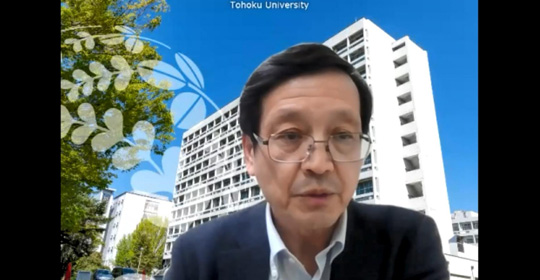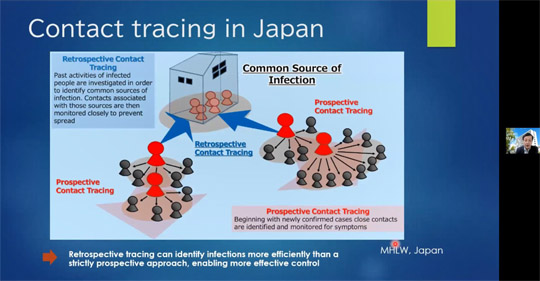JICA COVID-19 Webinar Series - Sharing of Japanese Experiences - 2nd Webinar "Japan's Public Health Approach for COVID-19 -past, present, and future-"
Day:2021.01.27
event |
Title: JICA COVID-19 Webinar Series - Sharing of Japanese Experiences - 2nd Webinar
Date: 27 January, 2021
Sponsors: JICA
Location: Online
Speaker:
Prof. OSHITANI Hitoshi(MD, MPH, PhD, Professor at Department of Virology, Tohoku University Graduate School of Medicine, Japan)
Moderator:
Dr. ISONO Mitsuo (Senior Advisor, Human Development Department, JICA)
Dr. TANAKA Go (Executive Technical Advisor, Human Development Department, JICA)
MC:
Ms. MAKIMOTO Saeda (Principal Research Fellow, JICA Ogata Sadako Research Institute for Peace and Development)
The end of the COVID-19 pandemic is still not in sight. To overcome these uncertain challenges, Japan set the goal of "leaving no one's health behind". JICA is taking a holistic approach to addressing the pandemic and health security in our partner LMICs by focusing on prevention, precaution and treatment. By using this approach, we hope to contribute to the protection of people's lives as the urgent target and build more resilient societies.
In a situation we don't have the right solution for yet, it is imperative to continuously share the latest research findings, as well as practical knowledge and experience gained through practice. The aim of this webinar is to invite distinguished Japanese researchers and clinicians to share their latest knowledge and experience in their respective fields, and to promote each country's efforts in protecting people's lives from COVID-19.
Prof. OSHITANI started with exploring clinical and epidemiological differences between SARS and COVID-19 and early findings of COVID-19 cases in Japan. Then, he discussed how successful Japan's approaches in curbing the virus were, such as: bidirectional contact tracing, cluster-busting, so-called avoiding Three C's approach, etc. were, and showed substantial epidemiological data.
The webinar was joined by more than 693 participants from 60 countries around the world. During a Q&A session, lots of burning questions were raised: how to effectively conduct retrospective contact tracing, and for asymptomatic/pre-symptomatic period, how to implement measures of avoiding Three C's in a setting like public transportation, etc. Finally Prof. OSHITANI emphasized that it is important to get early detection and early response for proper contact tracing in resource-limited settings.



scroll